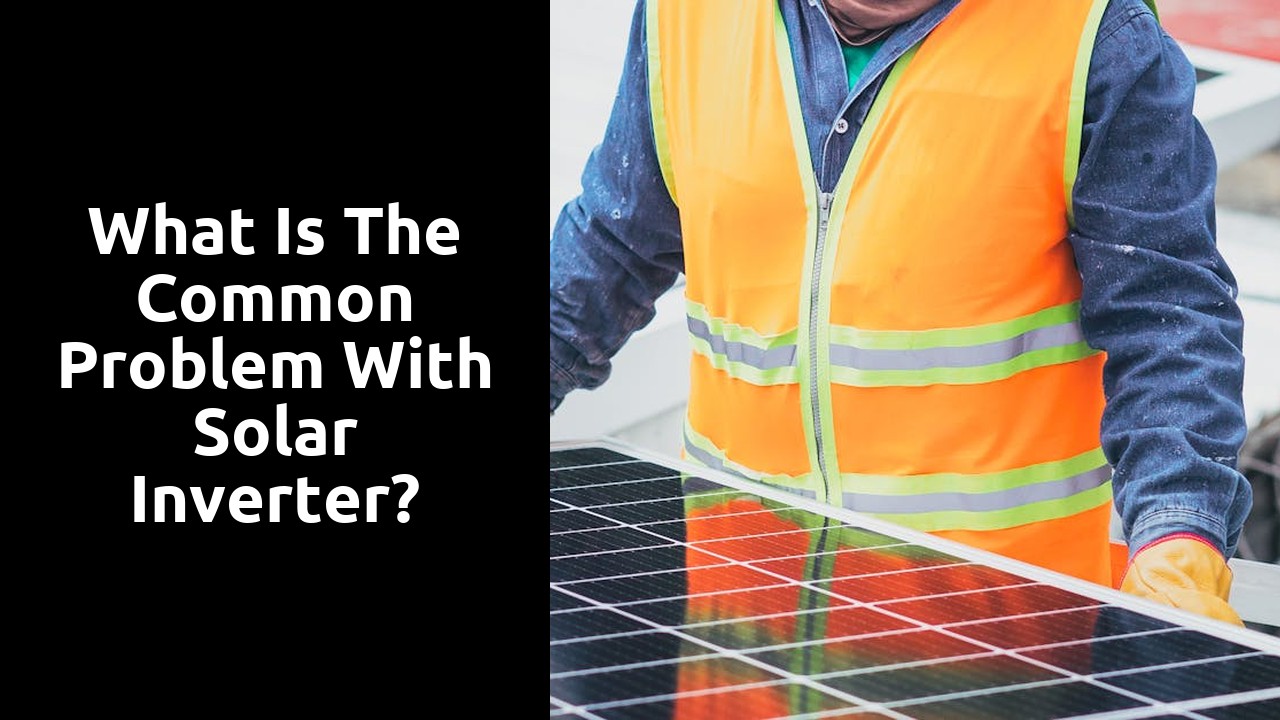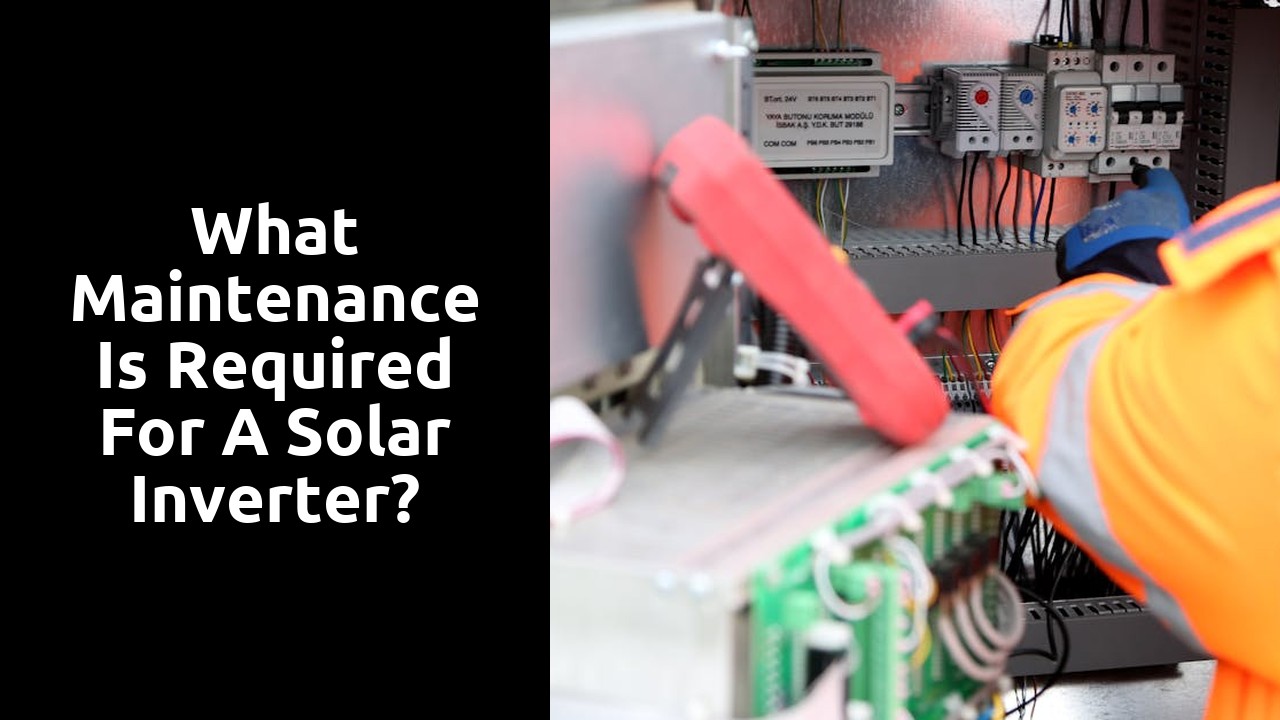
any prolonged downtime.
Solar Inverter Maintenance
plays a crucial role in ensuring that communication errors are identified early and resolved effectively to maintain the system's performance.
Addressing communication errors promptly is essential to maintain the seamless operation of the solar inverter system. Regular monitoring and troubleshooting can help in detecting any communication issues before they escalate. By investing in proactive Solar Inverter Maintenance practices, users can minimise the risk of disruptions and ensure that the system operates optimally for increased energy generation efficiency.
Fixing Communication Issues for Seamless Operation
When facing communication errors with solar inverters, troubleshooting and resolving the issues promptly is crucial for the seamless operation of the system. Regular maintenance checks play a vital role in detecting potential communication faults early on, allowing for timely intervention. Technicians should conduct thorough inspections of wiring connections, communication cables, and software interfaces to identify any disruptions. By adhering to a proactive approach in solar inverter maintenance, operators can minimise downtime and optimise the efficiency of their renewable energy system.Table Of Contents
It is imperative to establish a systematic approach to address communication errors in solar inverters to ensure uninterrupted functionality. Implementing a structured maintenance schedule that includes routine monitoring and testing of communication protocols can significantly enhance the reliability of the system. By investing in training programs for maintenance personnel and equipping them with the necessary skills to troubleshoot communication issues effectively, operators can mitigate potential risks and uphold the performance of the solar inverter. Regular reviews and updates of communication systems are essential to maintain a seamless operation and maximise the benefits of solar energy generation.Reviewing Inverter Efficiency
Trouble
Encountering DC arc faults in solar inverters can be a challenging issue that requires prompt intervention for safety and system efficiency. When left undetected, DC arc faults pose a risk of fire hazards and may lead to significant system downtime. Regular inspection and testing procedures are essential to identify and address potential faults before they escalate. Professional technicians should be engaged to conduct thorough checks and implement necessary repairs to rectify DC arc faults in a timely manner. Comparing efficiency ratings for optimal performance
Effective troubleshooting of DC arc faults can ultimately enhance the longevity and performance of solar inverters. Engaging in proactive maintenance practices and investing in cutting-edge diagnostic tools can aid in the early detection and resolution of these faults. By adhering to stringent maintenance schedules and promptly addressing any abnormalities, the reliability and safety of solar energy systems can be upheld. Prioritising the upkeep and monitoring of inverters can ensure seamless operation and optimal energy production for residential and commercial setups alike.Factoring in Climate Variability
em immediately upon detecting any signs of a fault is essential to prevent further damage or potential hazards. Engaging qualified technicians to investigate and rectify the issue is imperative for safe and effective resolution of DC arc faults in solar inverter systems. Regular training and upskilling of maintenance personnel can also enhance the capacity to promptly address any faults that may arise.
IssueComparing string inverters vs. microinverters
Solar Inverter Maintenance is one of the crucial aspects often overlooked by solar system owners. Ground fault alarms can become a common issue in solar inverters, triggering safety concerns and system downtime. When faced with ground fault alarms, immediate action must be taken to diagnose and rectify the underlying problems. Regular maintenance checks can help prevent these faults, ensuring the longevity and efficiency of the solar power system.FAQS
Another issue frequently encountered with solar inverters is DC arc faults, which can pose serious risks to the system and its surroundings. Detecting these faults early on is essential to prevent any potential damage or safety hazards. By incorporating routine inspections and troubleshooting procedures into Solar Inverter Maintenance practices, the likelihood of DC arc faults can be minimised, promoting a safe and reliable solar energy system.
Dealing with Ground Faults and Ensuring SafetyHow important is inverter efficiency in a solar system?
d system malfunctions. Dealing with ground faults involves identifying the source of the fault, isolating the affected circuit, and resolving the grounding issues to ensure safety.Climate variability plays a significant role in the efficiency and performance of a Solar Inverter System Design. The amount of sunlight a solar system receives is influenced by factors such as seasonal changes, weather conditions, and geographical location. When sizing an inverter for a solar system, it is crucial to consider these variables to ensure optimal functionality and output.
What measures can be taken to address ground faults in solar inverters and ensure safe operation?Seasonal changes can impact the amount of sunlight available to a solar system, affecting its overall performance. In regions with distinct seasons, such as Australia, the angle of sunlight and daylight hours can vary significantly throughout the year. To account for these changes, it is essential to select an inverter that can adjust to varying levels of sunlight and maximise energy production to meet the needs of the solar system.
To address ground faults in solar inverters, it is important to regularly inspect the grounding system, check for loose connections, and install ground fault protection devices. Proper maintenance and prompt action in response to ground fault alarms can help ensure the safe and efficient operation of solar inverters.Adjusting for seasonal changes in sunlight
When considering the impact of seasonal changes on a Solar Inverter System Design, one must account for variations in sunlight intensity and duration throughout the year. In countries like Australia, where sunlight patterns can shift significantly between summer and winter, adjusting the inverter size becomes crucial to ensure optimal energy production. Failing to factor in these seasonal variations could result in inefficient energy conversion and potential losses in electricity generation capacity. Locations
Locations